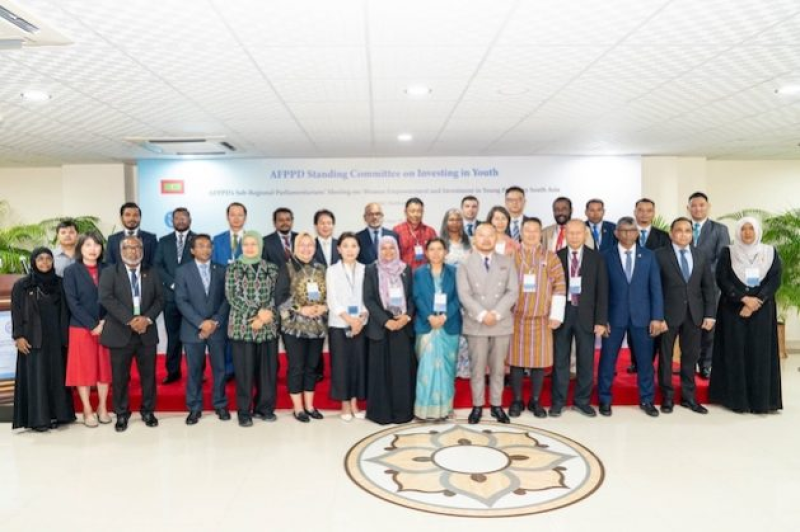- Intimidation or bloodshed cannot halt Bangladesh’s march to democracy |
- Khaleda Zia integral to an important chapter in BD history: Yunus |
- Enthusiasm marks Victory Day celebrations across Bangladesh |
- Dhaka-Delhi ties deep; to be shaped by trust, dignity, mutual respect |
- EU deploys election observation mission to Bangladesh |
Maldives lawmakers vow to empower future women leaders

Delegates at AFPPD’s Sub-Regional Parliamentarians’ Meeting on Women Empowerment and Investment in Young People, which focused on the ICPD Program of Action and 2030 Agenda.
A meeting of parliamentarians in Malé, the Maldives, pledged to create an enabling environment for emerging women leaders by supporting them and promoting a political culture based on mutual respect, inclusivity, and equal opportunity.
This was a key feature of the Malé Declaration, endorsed by over 40 participants from parliaments, governments, international organisations, NGOs, youth groups, and academia across 15 countries. The declaration was adopted during the AFPPD Sub-Regional Parliamentarians’ Meeting on Women Empowerment and Investment in Young People. The event focused on the ICPD Programme of Action and the 2030 Agenda for Sustainable Development, aiming to promote youth and women's empowerment.
The meeting was co-hosted by the People’s Majlis of the Maldives and the Asian Forum of Parliamentarians on Population and Development (AFPPD), with support from the United Nations Population Fund (UNFPA) through the Japan Trust Fund (JTF).
The lawmakers agreed to commission evidence-based research to examine barriers to women’s political participation. According to the declaration, the research will explore social, cultural, economic, and institutional impediments that hinder women’s pursuit of political office and leadership roles across member states in Asia, including the Maldives. The findings will guide policy interventions and legislative reforms to enhance women’s political engagement.
In an interview ahead of the meeting, Dr Anara Naeem, MP for Huraa Constituency, told IPS that advocacy for women’s rights begins at a young age and that parliamentarians play a key role in encouraging women’s participation in the economy.
Responding to a question on UNFPA research showing that 40 percent of young women are not engaged in employment, education, or training (NEET), she pointed to high youth unemployment despite free education up to the first university degree. Like many countries, the Maldives faces gender stereotypes that emphasise women’s domestic roles over their careers, hindering social participation. “Stereotypes limit women’s public engagement,” she said.
Naeem explained that policymakers are addressing these challenges through multiple strategies, such as offering postgraduate scholarships, expanding vocational training in tourism, technology, and healthcare, and promoting women’s entry into STEM and non-traditional fields via mentorship programmes. Leadership and career advancement schemes are also being developed to break the glass ceiling.
Parliamentarians are exploring innovative ways to boost women’s hiring in the public sector and are offering incentives for private sector partnerships, such as tax benefits, flexible work arrangements, and career progression pathways. “We also host community dialogues (haa saaba) and engage religious leaders to shift mindsets,” Naeem added.
The Maldivian government is working to implement gender equality laws—including anti-discrimination measures, parental leave, and policies to break the glass ceiling—and is allocating budget support for childcare, job programmes, and women’s grants. These include paid maternity leave for up to six months and unpaid leave for a year in all government offices, with encouragement for the private sector to follow suit.
However, Naeem stressed that success depends on “coordinated action across government, the private sector, NGOs, and communities to create relevant jobs, dismantle cultural barriers (including the glass ceiling), provide critical support (childcare, robust maternity leave), and enable flexible pathways for young women’s economic and social participation.”
Parliamentarians also committed to collaborating with Maldivian authorities to review and enhance the national school curriculum. The initiative aims to align education with job market needs and integrate principles of gender equality, women’s rights, civic responsibility, leadership, and sustainable youth development to foster progressive values from an early age.
Lawmakers are also addressing youth-related issues such as drug use and mental health by combining legislative action, oversight, resource allocation, and public advocacy. This includes reforming drug laws to target traffickers, decriminalising addiction, and prioritising treatment. Parliamentarians are lobbying for increased funding for rehabilitation centres, training of psychologists, and medication subsidies, while raising awareness through national media and local dialogues.
“Our key focus in law reform includes better rehab frameworks, funding oversight, public awareness partnerships, building support systems, minimising service delivery gaps, and reducing relapse—shifting towards prevention and recovery in the Maldivian context,” Naeem said.
Participants at the meeting reaffirmed their commitment to working with all stakeholders to advance the ICPD Programme of Action, achieve the 2030 Agenda, and uphold the 2024 Oslo Statement of Commitment.

